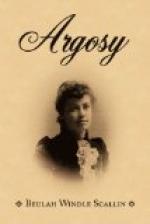The movement which most impressed me was the Credo.
There was a certainty of conviction in its opening phrases pointing to a real earnestness of purpose. It was as if the composer’s faith had successfully withstood all the doubts, anxieties, and conflicts of life. It was the song of the victorious Christian who saw before him the prize for which he had long and steadfastly contended. He believed; he did more than that; he actually realised. It was the joy, not of anticipation, but of actual possession, the consciousness of the Divine life dwelling in the heart, cramped and hindered by its surroundings, but destined to develop in the light of clearer and fuller knowledge.
As the story of the Incarnation and Passion was told, there crept over the listener feelings of mingled sadness and thanksgiving: sadness at the life of suffering and pain endured “For us men and for our salvation,” and thanksgiving for the Gift so freely bestowed. And then Heaven and Earth combined to tell the story of the Resurrection morning, and the strains of thankfulness and praise increased until it seemed as if the writer had at length passed from Earth to Heaven, and was face to face with the joys of the “Life Everlasting” which all the resources of his art were powerless fully to express.
The music ceased, and I awoke as from a dream.
“You need not tell me your opinion,” said the Doctor; “your face shows it most unmistakably; you can form only a very faint idea of its beauties without the voice parts. When you hear our choir sing it you will say it is the most powerful sermon you have ever heard within these walls.”
“Who is the composer?” I asked excitedly, my curiosity thoroughly aroused.
“My dear fellow,” replied Dr. F., “before telling its history, you must see the proofs I have in my possession, for I shall have to relate one of the most remarkable stories you have ever heard. So strange indeed are the circumstances connected with that old Service that I have kept them to myself, lest people should think me an eccentric musician. Our late Dean knew part of them and witnessed some of the things I shall tell you. The story will take some little time, but if you will come across to my house you shall hear it and also see the proofs I hold in my possession.”
II.
We went direct from the cathedral into the library of Dr. F.’s house, where, without wasting any time, he produced a roll of manuscript and gave it me to read.
It was tied up neatly with tape and enclosed in another sheet of paper, which bore the date January, 1862, and a note in the Doctor’s handwriting stating that he had discovered it in an old chest in the cathedral library.
The document itself was yellow with age and was headed:
“Certain remarkable
passages relating to the death of the late
Ebenezer Jenkins, sometime
organist of this cathedral, obiit April
3, 1686; related by
John Gibson, lay clerk.”




